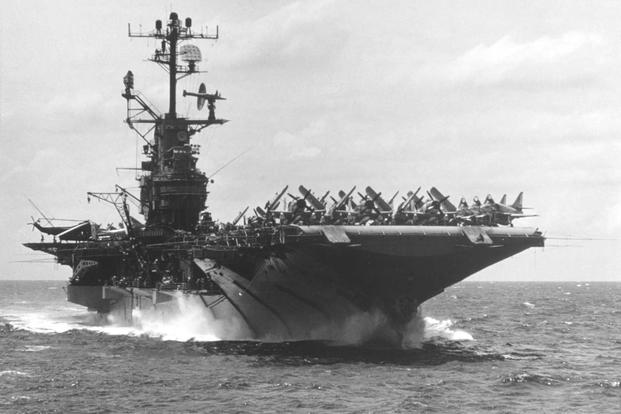The Senate unanimously approved a bill Wednesday to extend disability benefits to veterans who served on Navy ships off the coast of Vietnam, signaling the end of a decades-long fight for these former sailors and Marines to receive compensation for diseases presumed to be caused by exposure to Agent Orange and other defoliants used during the Vietnam War.
Following similar approval by the House last month, the Senate vote sends the bill to President Donald Trump for his signature.
In January, the judicial branch weighed in on the debate over whether these veterans, who participated in and supported combat operations while serving offshore during the Vietnam War, rated disability benefits for diseases linked to chemical defoliants used on land.
In a 9-2 decision, the U.S. Court of Appeals for the Federal Circuit upheld a ruling in favor of the veterans, saying Congress never intended to exclude service members in the seas around Vietnam in the original legislation that awarded veterans benefits.
Related content:
-
Justice Department Won't Appeal Agent Orange Ruling Benefiting Blue Water Navy Vets
-
Court Decides 'Blue Water' Navy Vets Should Be Eligible for Agent Orange Benefits
Earlier this month, the Justice Department decided against appealing the court's decision.
The legislation passed by both the House and Senate will extend disability compensation to personnel who served offshore of the Republic of Vietnam between Jan. 9, 1962, and May 7, 1975, within 12 nautical miles of the coast of Vietnam and Cambodia, along a line of demarcation spelled out in the bill.
Those eligible include veterans with one or more of the presumptive disease whose claims were previously denied, as well as new claims.
The bill also covers veterans who served in the Korean Demilitarized Zone between Sept. 1, 1967, and Aug. 31, 1971, as well as children born to veterans who served in Thailand between January 1962 and May 1975 who have spina bifida.
The legislation could affect up to 90,000 veterans, although Retired Navy Cmdr. John Wells, an attorney with Military Veterans Advocacy who represented Alfred Procopio Jr., the plaintiff in the case decided in January, said the way the bill is written may limit awards, excluding as many as 55,000 service members, including many assigned to aircraft carriers that operated farther out to sea.
He recommends eligible veterans immediately file their claims packages, before the legislation goes into effect on Jan. 1, 2020, because the Procopio decision likely covers more veterans.
"If they get their claim in, it may be grandfathered," Wells said. "If you were on a ship, especially a carrier that served on the fringe of the territorial sea, it's imperative that they get their claim in now."
Veterans service organizations who supported the legislation urged Trump to sign the bill, which will provide thousands of Vietnam veterans and others disability benefits.
"We salute the entire 116th Congress for ensuring that taking care of veterans remains the most bipartisan and bicameral issue in Washington," Veterans of Foreign Wars National Commander B.J. Lawrence said in a statement. "We now urge the president to quickly sign the bill into law so that tens of thousands of Vietnam veterans can have their disability benefits restored."
The Congressional Budget Office has estimated that the bill could cost as much as $1.1 billion over 10 years; the Department of Veterans Affairs has estimated the cost to be as high as $5.5 billion.
The cost is to be covered by increasing fees on VA home loans for veterans who don't have a disability rating.
The VA has named 15 diseases as presumed to be related to herbicide exposure, including Hodgkin's disease, multiple myeloma, non-Hodgkin's lymphoma, early-onset peripheral neuropathy, porphyria cutanea tarda, prostate cancer, respiratory cancers, soft-tissue sarcoma, chloracne, type-2 diabetes mellitus, light chain amyloidosis, ischemic heart disease, chronic B-cell leukemias, Parkinson's disease, and spina bifida in offspring of veterans.
VA officials have spent more than three years considering whether to add four more conditions -- bladder cancer, hypothyroidism, hypertension and Parkinson's-like symptoms -- to the list. A VA official told Congress on March 26 that the department would announce a decision "within 90 days" on those diseases.
House Veterans Affairs Committee Chairman Rep. Mark Takano, D-California, said Wednesday that passage of the Blue Water Navy bill, H.R. 299, finally "delivers on a promise made to ... veterans."
"Tonight, we can finally tell the tens of thousands of veterans who were exposed to Agent Orange during the Vietnam War but wrongly denied benefits that justice is finally coming," Takano said. "By passing the Blue Water Navy Vietnam Veterans Act, Congress has proven to the nation, to our veterans and their families, and the surviving loved ones of those we lost to toxic exposure, that we have righted a terrible injustice."
-- Patricia Kime can be reached at Patricia.Kime@Military.com. Follow her on Twitter at @patriciakime.














